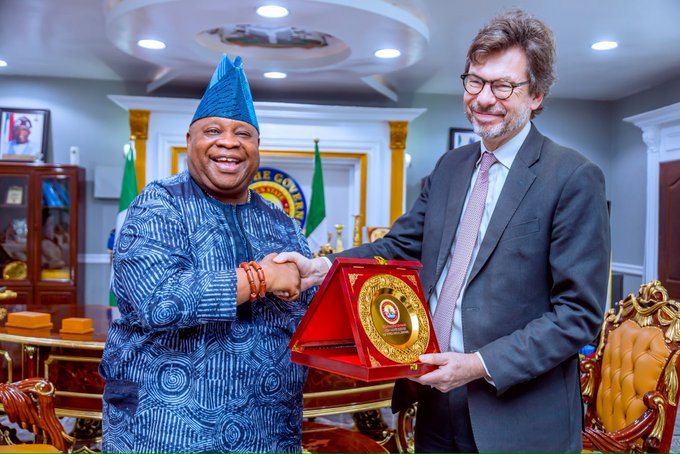Osun State Governor Ademola Adeleke has raised a diplomatic alarm over what he described as a calculated attempt to subvert democracy in the state. The governor has formally reported the Inspector-General of Police (IGP), Kayode Egbetokun, to British diplomats, accusing him of enabling lawlessness and supporting opposition elements in an ongoing political crisis.
During a crucial meeting with top British envoys, including Deputy High Commissioner Jonny Baxter, Governor Adeleke did not mince words in his condemnation of the police leadership. He alleged that the security agencies, under Egbetokun’s command, were backing illegal attempts by the opposition All Progressives Congress (APC) to seize control of local government councils in the state.
“It is unfortunate and a disservice to democracy that the Inspector General of Police is colluding with the APC to enforce a non-existing court order,” Adeleke declared. “This is a serious threat to democracy in Nigeria.”
The governor’s outcry follows a recent standoff over the control of local government councils in Osun State. The crisis erupted after members of the APC allegedly stormed local government secretariats and took over administrative offices, despite a court ruling that voided their tenure. Adeleke insists that security operatives turned a blind eye to these actions and, in some cases, actively assisted in enforcing what he described as an illegal occupation.
“You are in my state at a critical juncture in our political life. We face an existential threat to our democratic system from those who should be its guardians,” Adeleke told the British diplomats. “Despite all efforts to maintain peace, security forces, instead of upholding the law, are actively supporting the violation of democratic principles.”
The Osun State government has repeatedly condemned what it calls “police complicity” in the local government crisis. Adeleke emphasized that his administration had sought to prevent any political escalation by instructing his party members to refrain from forceful actions. However, he argued that the APC, backed by security forces, disregarded these peace efforts.
“But the opposition, supported by the police, went ahead to break into the local government secretariats,” he lamented. “Security men openly sided with them to enforce illegality.”
Despite the turmoil, the governor assured the diplomats that the upcoming local government elections would proceed as planned, stressing that his administration remains committed to democratic governance.
“Our local government election is holding on Saturday,” he announced. “Our people are ready for elections. We will not allow democracy to be destroyed.”
Governor Adeleke also used the occasion to highlight the developmental strides his administration has made, despite the political tension. He pointed out that Osun has made notable progress in reducing its infrastructure deficit by 40%, cutting down the state’s debt profile, and implementing policies that prioritize workers’ welfare and pensioners’ health care.
The governor further explained that Osun has taken bold steps to improve the ease of doing business in the state, streamlining taxation policies and introducing a 45-day window for issuing Certificates of Occupancy. These reforms, he said, demonstrate his government’s commitment to transparency and economic growth.
British Deputy High Commissioner Jonny Baxter, in his response, underscored the UK’s commitment to supporting democratic principles in Nigeria. He expressed concern over the unfolding events in Osun State and urged all political actors to prioritize peace and respect for the rule of law.
“Nigeria is a key partner to the UK, and we encourage all stakeholders to uphold democratic values, ensure peaceful governance, and respect legal institutions,” Baxter stated. “It is vital that law enforcement remains neutral and that political disputes are resolved through lawful channels.”
Baxter, who was accompanied by Katherine Fernandes, Second Secretary Political, and Wale Adebajo, Senior Political Adviser, reiterated that democracy thrives when institutions function independently and in accordance with the law.
The political crisis in Osun has been building up since the controversial local government elections conducted by the previous APC administration. Those elections were later nullified by the courts, leaving a vacuum that both the ruling Peoples Democratic Party (PDP) and the opposition APC have sought to fill. Adeleke has accused the APC of using backdoor tactics to regain control of local councils, a move he insists undermines the judicial process and democratic governance.
Observers have noted that the situation in Osun is reflective of broader political tensions in Nigeria, where state and federal institutions often clash over control of local governance structures. Security agencies, which are federally controlled, have frequently been accused of partisanship, a claim the police force has consistently denied.
In the lead-up to the scheduled elections, political analysts warn that any further escalation in Osun could set a dangerous precedent for the country’s democratic stability. Adeleke’s direct appeal to the international community suggests growing concerns that internal mechanisms may not be sufficient to resolve the crisis peacefully.
The governor’s call for diplomatic intervention is not unprecedented. Nigerian political leaders have, in the past, sought international attention on domestic matters, particularly when there are concerns about electoral integrity, security agency neutrality, and threats to democratic governance.
For now, all eyes are on the Osun local government elections. As the state government moves forward with the polls, the role of security agencies will be closely watched. Will the police remain neutral, or will the accusations of bias hold weight? And more importantly, will the election proceed without further conflict?
Governor Adeleke has made it clear that he will not back down in the face of what he describes as an assault on democracy. As he put it: “We call on the diplomatic community to take judicious note of the rape of democracy ongoing in Osun State. We particularly call attention to the negative role of security agents in this crisis. All stakeholders must abide by the rule of law in a democracy. There is no room for self-help.”

